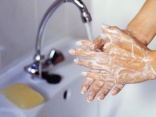Home › magazine › june july 2014 › latest news › Hand hygiene campaigns are cost effective – study
Hand hygiene campaigns are cost-effective – study
2nd of May 2014Hand hygiene programmes are financially feasible - and their implementation costs are relatively low compared with the savings that can be made.
These were the conclusions reached by an economics expert at a recent hand hygiene conference in London.
Joy Townsend, emeritus professor of economics and primary care at the London School of Hygiene and Tropical Medicine, drew her conclusions after examining various hand hygiene campaigns and the effects they had on health and the economy.
For example, she referred to the results of a 2005 study on the effects of hand washing on child health in Karachi, Pakistan. Hand hygiene was promoted in 25 squatter settlements where each household was provided with soap. No such provision was made in 11 adjoining settlements.
"During the course of the study there was a 50 per cent reduction in pneumonia in the under-fives in those settlements where soap was provided," said Townsend. "There was also a 53 per cent reduction in diarrhoea among under 15s."
Townsend then referred to a four-year Taiwan study in which alcohol-based hand sanitisers were placed at strategic points around three hospitals and healthcare staff were given hand hygiene training. Financial incentives were offered to wards that showed outstanding hand hygiene compliance - and fines were threatened for non-compliance.
"At the end of the scheme we estimated that 1,424 episodes of healthcare-acquired infections had been averted and compliance had improved from 43.3 per cent to 95.6 per cent," said Townsend.
"After the costs of the alcohol sanitisers, posters and financial incentives had been deducted, the net benefit of the trial was US$5,289 million."
The costs of illness due to poor hand hygiene at work could be astronomical, according to Townsend. "For example, sick leave as a result of poor washroom hygiene cost the UK economy £4.2 billion in 2013, and this was estimated to reduce UK GDP by 0.8 per cent, or £13.7 billion," she said.
And she added that the United Nations had considered the cost-benefit trade-offs of a US scheme to improve sanitation in developing countries. "The study concluded that hygiene promotion was the single most cost-effective health intervention, costing only US$5 a day," said Townsend. "Providing basic sanitation, on the other hand, costs between US$10-100 a day."
She concluded that a hospital-wide hand hygiene programme was financially feasible and could result in significant reductions in healthcare-acquired infections.
"Implementation costs would be low compared with the savings that could be made," she said. "Hand hygiene programmes are only one component of infection control, of course, but all evidence points to the fact that they offer a very high level of cost-effectiveness."
More than 60 delegates attended the conference which took the theme: "The science and behaviour behind hand washing at home, work and on the move". The event was hosted by the Royal Society for Public Health.










